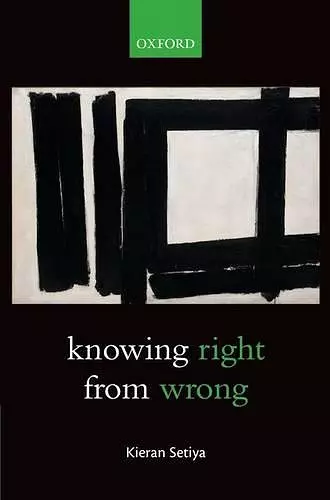Knowing Right From Wrong
Format:Hardback
Publisher:Oxford University Press
Published:29th Nov '12
Currently unavailable, and unfortunately no date known when it will be back
This hardback is available in another edition too:
- Paperback£32.49(9780198709619)

Can we have objective knowledge of right and wrong, of how we should live and what there is reason to do? The thought that we can is beset by sceptical problems. In the face of radical disagreement, can we be sure that we are not deceived? If the facts are independent of what we think, is our reliability a mere coincidence? Can it be anything but luck when our beliefs are true? In Knowing Right From Wrong, Kieran Setiya confronts these questions in their most compelling and articulate forms: the argument from ethical disagreement; the argument from reliability and coincidence; and the argument from accidental truth. In order to resist the inference from disagreement to scepticism, he argues, we must reject epistemologies of intuition, coherence, and reflective equilibrium. The problem of disagreement can be solved only if the basic standards of epistemology in ethics are biased towards the truth. In order to solve the problem of coincidence, we must embrace arguments for reliability in ethics that rely on ethical beliefs. Such arguments do not beg the question in an epistemically damaging way. And in order to make sense of ethical knowledge as non-accidental truth, we must give up the independence of ethical fact and belief. We can do so without implausible predictions of convergence or relativity if the facts are bound to us through the natural history of human life. If there is objective ethical knowledge, human nature is its source.
I am happy to commend an excellent contribution to a perennially contested area. All philosophers can profit from this book, and should admire the meticulous craftsmanship and the modesty and intelligence of its explorations. * Simon Blackburn, Times Literary Supplement *
careful, lucid, and attractive . . . I am happy to commend an excellent contribution to a perennially contested area. All philosophers can profit from this book, and should admire the meticulous craftsmanship and the modesty and intelligence of its explorations. * Simon Blackburn, Times Literary Supplement *
Kieran Setiya's book . . . aims to silence three skeptical challenges that build from concerns about moral disagreement, the reliability of our moral belief forming mechanisms, and the possibility that we might come to have true moral beliefs completely by accident. Setiya's response to these challenges is sophisticated and nuanced: he identifies what the structure of justification and the nature of ethics must be like if these skeptical concerns are to be refuted, and he builds a case that justification and ethics are actually like this. The result is a rich and interesting defense of moral knowledge and justification . . . a rich and provocative contribution to moral epistemology and to ethical theory more generally * Charlie Kurth, Notre Dame Philosophical Reviews *
Setiya has written a book that is imaginative and novel, both in the way he develops the skeptical worries at its core, and in the way he addresses them. * Paul Schofield, Journal of Moral Philosophy *
ISBN: 9780199657452
Dimensions: 211mm x 143mm x 17mm
Weight: 330g
192 pages